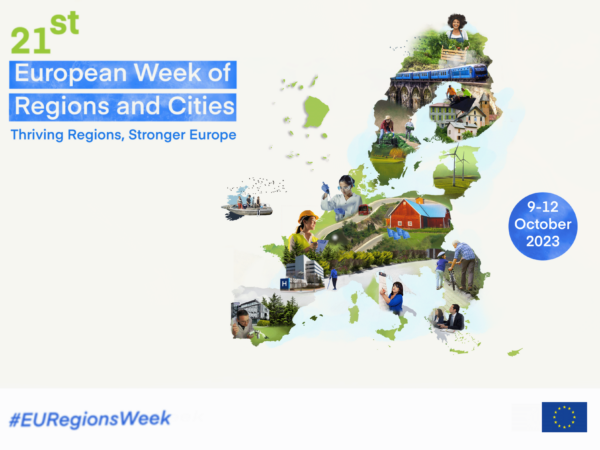Registration to #EURegionsWeek 2023 is Open

The European Week of Regions and Cities is an annual four-day event during which cities and regions showcase their capacity to create growth and jobs, implement European Union cohesion policy, and prove the importance of the local and regional level for good European governance.
The 2023 Week takes between 9-12 October 2023 and is held in-person in Brussels. More on the #EURegionsWeek can be found here.
As in previous years, the learned societies (European Regional Science Association ERSA, Association of European Schools of Planning AESOP and the Regional Studies Association European Foundation RSA Europe) led by RSA Europe collate and develop sessions that showcase the best of new research to the largely policy audience at the #EURegionsWeek.
The following sessions are free to attend but as places are limited, we recommend signing up as soon as possible to avoid disappointment.
Remote Work Possibilities to Enhance Border Regions Labour Markets – Tuesday 10th October, 09.30-10.30 CEST
The workshop provides insights into EU border regions availability of occupations and the resulting amount of jobs that allow for remote work. It analyses country-specific legal provisions that may hinder firms to employ individuals from abroad and discusses which legal aspects have to be amended and harmonized EU wide to benefit from remote work across borders. Thus, the workshop elaborates possibilities to improve competitiveness of border region labour markets caused by remote work.
Discussing Persistent Legal-administrative and Institutional Border Barriers Across the EU – Tuesday 10th October, 11.30-12.30 CEST
This session showcases current academic research and policy results on policy actions aimed at reducing persistent legal administrative and institutional border barriers across the EU. This session offers knowledge exchange between policymakers, researchers, politicians, and practitioners and a clear contribution to border and regional studies by highlighting policy measures towards a more cohesive EU territory.
Do you Believe in Climate Neutrality by 2040? Levers and Cornerstones of the Transformation – Tuesday 10th October, 14.30-15.30 CEST
The presentations cover various strategies, policy instruments and key points of the transformation towards climate neutrality. Different regional characteristics, starting points and aspects are combined by the presented input and followed by the interactive exchange on the challenges, solutions and ideas for the energy turn. A moderator-led series of questions (partly coming from the participants on site) is answered by the participants simultaneously via online tools and commented by speakers.
Mid-sized University Cities in the European Union: Graduate Flows and Local Labour Market – Tuesday 10th October, 16.30-17.30 CEST
This session will highlight the role of universities in regional & urban development with a focus on small & mid-sized cities, present the push & pull factors that are in operation at university locations & determine factors that result in a brain-drainers or brain-gainer location. Insights will be provided on links between universities & an entrepreneurial environment that could act as driving force for graduates’ decision to stay/to leave or to attract young graduates from other locations.
‘Left Behind Places’: Findings of a Cross-National Study – Wednesday 11th October, 09.30-10.30 CEST
The term ‘left-behind places’ has emerged as a topic of great interest to researchers and policy-makers, focusing particularly on regions in post-industrial transition. This session will present findings from a cross-national research project on ‘left behind places’ in France, Germany and the United Kingdom. The session will focus on three sets of findings: trajectories of regional change; patterns of residential mobility and immobility; and, employment, access to services and place.
How European Regions can Stop the Brain Drain and Attract New Talent – Wednesday 11th October, 11.30-12.30 CEST
This session will create a platform for interdisciplinary discussions focusing on how EU regions can create development based on local talent. It will attempt to address the question: how can we create conditions to use the wealth of knowledge offered by Universities and retain the thousands of young people who are looking for a job or maybe disappointed in their professional expectations, cross borders and go abroad, (also outside of the EU)? The audience will be engaged through interaction.
Research for Policy Makers: the European Parliament – Thursday 12th October, 09.30-10.30 CEST
During this workshop, colleagues of the European Parliament will present and discuss how they incorporate research on cohesion and regional policy into their work. This workshop will examine how the EPRS supports the work of the European Parliament during the policy making process, with a particular focus on negotiations on cohesion and regional policy.
EU Regions Talk: Research today, Policy tomorrow – Regional Studies Association and RSA Europe – Wednesday 11th October, 16.30-16.45 CEST
Knowledge mobilisation is at the heart of the missions of the academic led organisations Regional Studies Association and RSA Europe. In this session, Sally Hardy offers information on how to engage with learned societies to the benefit of empirically evidenced policy making.
